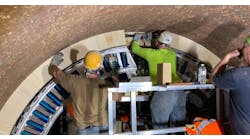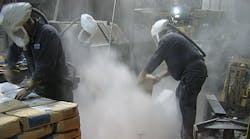The federal Occupational Health and Safety Administration charged an Ohio foundry with one willful and 17 serious safety and health violations concerning “dangerous noise levels” and silica dust. The agency announced that workers at MCM Precision Castings Inc. were exposed to dangerously high noise levels and crystalline silica dust, and that an OSHA inspection last July discovered that the foundry had not conducted noise testing, nor monitored workers’ exposure to the noise and dust, nor provided suitable protective equipment.
The agency proposed penalties totaling $76,200 for the violations, and the foundry was allowed 15 business days from receipt of its citations and penalties to comply, request an informal conference with OSHA's area director, or contest the findings.
MCM Precision Castings in Weston, OH, pours specialty carbon alloy steels, tool steels, and stainless steel as sand castings, and also produces investment castings and ceramic mold castings. Its customers range among a long list of industrial sectors, including automotive, railroad, agricultural and industrial machinery, food processing equipment, machine tools, and many others.
"With 18 violations, it's clear that MCM Precision Castings' priorities don't include the safety and health of its workforce. Failing to provide basic safety equipment and neglecting to monitor worker exposure is unacceptable," stated OSHA area director Kim Nelson.
“Willful” violations are those that, according to OSHA, are committed with intentional, knowing, or voluntary disregard for legal requirements, or with plain indifference to employee safety and health. Inspectors charged MCM with one willful violation for failing to provide audiometric testing for employees, which can identify premature hearing loss.
OSHA states that “noise-related hearing loss is one of the most prevalent occupational health concerns in the U.S., with an estimated 30 million people occupationally exposed to noise each year.” It can cause permanent hearing loss, it added.
The other 17 citations were classified as “serious,” which indicates conditions from which death or serious physical harm may result, and which an employer knew or should have known exists.
The serious violations cited at MCM involved workers exposed to silica and other respirable dust in excess of levels allowed during an eight-hour period. OSHA inspectors claim the foundry allowed silica dust to accumulate and failed to implement a respiratory protection program to limit workers’ exposure. It said the company also failed to train employees about hazards and provided inadequate protective equipment.
Finally, OSHA claims that MCM did not protect workers from dangerous machinery, that machines lacked effective guarding, and that improper lockout/tagout procedures were used to ensure machines were turned off before maintenance. It also found electrical safety violations and unsafe practices related to forklift operations.









